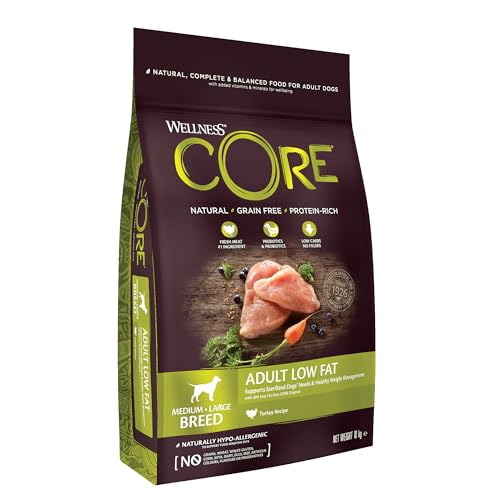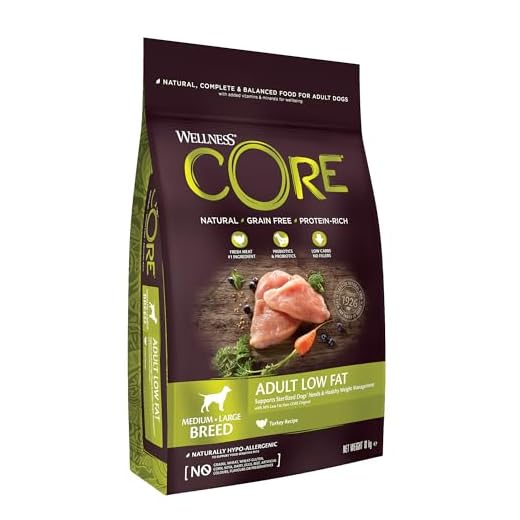







A diet low in fat is paramount for canines experiencing biliary issues. Opting for lean proteins such as skinless chicken or turkey can help mitigate discomfort. Incorporating easily digestible carbohydrates like white rice or sweet potatoes provides energy without stressing the digestive system.
Introduce fibre-rich vegetables such as carrots or green beans in moderation. These can aid digestion while providing necessary nutrients. Avoid high-fat meats and dairy products, as they may exacerbate symptoms. Instead, consider opting for commercially available diets specifically formulated for sensitive stomachs, which are often lower in fat content.
Always ensure fresh water is accessible, as hydration plays a crucial role in overall health. Small, frequent meals throughout the day can also be beneficial, allowing for easier digestion and reducing the load on the biliary system. Keep a close eye on any reactions to new foods, and consult a veterinarian for tailor-made recommendations.
Dietary Choices for Canines with Gallbladder Issues
Opt for a low-fat diet for your pet experiencing bile-related difficulties. Lean proteins such as skinless chicken, turkey, or fish will help maintain muscle mass while reducing strain on the digestive system. Supplement these proteins with easily digestible carbohydrates like white rice or sweet potatoes to provide energy without overwhelming the liver.
Incorporating Vegetables
Introduce vegetables such as carrots and green beans, which are low in fat and high in fibre. Steaming these options can enhance digestibility, making them more palatable for your furry friend. Avoid adding oils or fats during preparation, as these can exacerbate existing complications.
Hydration and Snacks
Ensure your companion has constant access to fresh water, as hydration is key to overall health. For treats, consider options like plain, unsweetened pumpkin or low-fat plain yogurt in moderation. These snacks can provide beneficial nutrients without overloading the system.
Identifying Suitable Ingredients for Gallbladder Health
Opt for low-fat proteins like skinless chicken breast, turkey, or white fish. These options provide essential nutrients without overwhelming the digestive system.
Include healthy carbohydrates such as sweet potatoes, brown rice, or oats. They offer energy while being gentle on the stomach.
Fruits and vegetables are beneficial as well. Incorporate:
- Carrots
- Green beans
- Apples (without seeds)
- Blueberries
These ingredients are rich in vitamins and antioxidants, supporting overall well-being.
Avoid high-fat foods like beef, pork, or dairy products to reduce stress on the bile system. Steer clear of processed meals that might contain hidden fats or additives.
Incorporating omega-3 fatty acids can be advantageous. Consider adding small amounts of fish oil or flaxseed oil to meals. These fats help reduce inflammation and improve liver function.
Hydration is key. Ensure constant access to fresh water, as proper fluid intake assists in digestion and nutrient absorption.
Monitor portion sizes and spread meals throughout the day to prevent overeating, which can strain the digestive organs. Frequent, smaller meals are preferable.
Consult a veterinarian for tailored recommendations based on individual health needs and adjust the diet according to their advice. Regular check-ups can help track progress and make necessary adjustments.
Portion Control and Meal Frequency for Affected Pooches
Serving smaller, more frequent meals can significantly benefit pets dealing with gallbladder issues. Instead of offering one or two large portions daily, consider splitting the daily intake into three to four smaller meals. This approach aids digestion and reduces the workload on the liver and gallbladder.
Practical Guidelines
Here are some practical tips for managing portion sizes and meal frequency:
| Meal Frequency | Portion Size |
|---|---|
| 3 meals per day | Each meal: 1/3 of daily calorie requirement |
| 4 meals per day | Each meal: 1/4 of daily calorie requirement |
Adjust portion sizes based on your pet’s specific needs, activity level, and overall health condition. It’s advisable to consult a veterinarian for tailored recommendations. Monitoring weight and adjusting portions accordingly can help maintain a healthy balance.
Hydration Considerations
Ensure your companion has constant access to fresh water, as proper hydration plays a crucial role in supporting organ function. Adding moisture to meals, like a bit of low-sodium broth, can enhance hydration while making the food more appealing.
For those exploring options, checking out best liked dog food can provide valuable insights into suitable brands that cater to their needs.
Homemade Diet Recipes for Dogs Facing Gallbladder Troubles
Brown rice combined with boiled chicken breast creates a gentle meal. Use skinless, boneless chicken to eliminate excess fat. Cook the rice until soft, mixing in shredded chicken for a nutritious dish. This combination provides easily digestible carbohydrates and lean protein.
Another option is sweet potatoes mashed with turkey. Steam or bake sweet potatoes until tender, then mash them and mix in ground turkey. This mix is rich in vitamins and offers anti-inflammatory properties, making it suitable for sensitive stomachs.
Carrots and green beans can be steamed and served alongside boiled fish, like cod or haddock. These vegetables are low in fat and high in fibre, promoting healthy digestion. Ensure the fish is cooked thoroughly, flaked, and free of bones before serving.
To create a soothing broth, simmer low-sodium chicken or vegetable stock with diced zucchini and spinach. Strain the mixture and serve as a light meal or a topping over rice. This broth is hydrating and easy on the stomach.
For a simple snack, consider plain pumpkin puree mixed with a small amount of low-fat plain yogurt. This treat is not only tasty but also supports digestive health due to the fibre in the pumpkin.
When preparing meals, avoid high-fat ingredients such as oils or fatty meats. Focus on lean proteins and well-cooked vegetables to ensure meals are gentle yet nutritious. Always consult a veterinarian before introducing new recipes to ensure they align with specific dietary needs.
Foods to Avoid When Managing Gallbladder Problems
High-fat ingredients must be eliminated from the diet. This includes fried items, fatty cuts of meat, and rich dairy products. Greasy foods can lead to discomfort and exacerbate existing issues.
Processed and Sugary Foods
Processed snacks and sugary treats are detrimental. These often contain unhealthy fats and artificial additives that can hinder recovery. Read labels carefully to avoid hidden sugars and preservatives.
Certain Vegetables and Grains
Certain vegetables, like onions and garlic, are harmful. Some grains, particularly those that are high in gluten, should also be avoided. Focus on easily digestible options to ease the digestive burden.
Consulting Your Veterinarian About Dietary Changes
Seek professional guidance before implementing any modifications to your pet’s nutrition. A veterinarian, familiar with your companion’s health history, can provide tailored advice based on specific conditions. Regular check-ups are key, especially when introducing new ingredients or meals.
Discuss any symptoms or changes in behaviour that may warrant a dietary review. Your vet can suggest appropriate food types or brands that align with your furry friend’s needs. They might recommend low-fat options or specific nutrients that promote recovery and overall wellness.
Consider scheduling follow-up appointments to assess how your pet responds to the new regime. This ongoing dialogue ensures any adjustments can be made promptly. Additionally, share any homemade recipes you wish to try, as veterinarians often appreciate being involved in the creative process of meal planning.
Lastly, remember to inquire about the best practices for portion sizes and feeding schedules. A well-structured plan can help manage your pet’s condition effectively. For those moments when you need a break from pet care chores, a reliable pressure washer hoover can keep your space clean and manageable.






